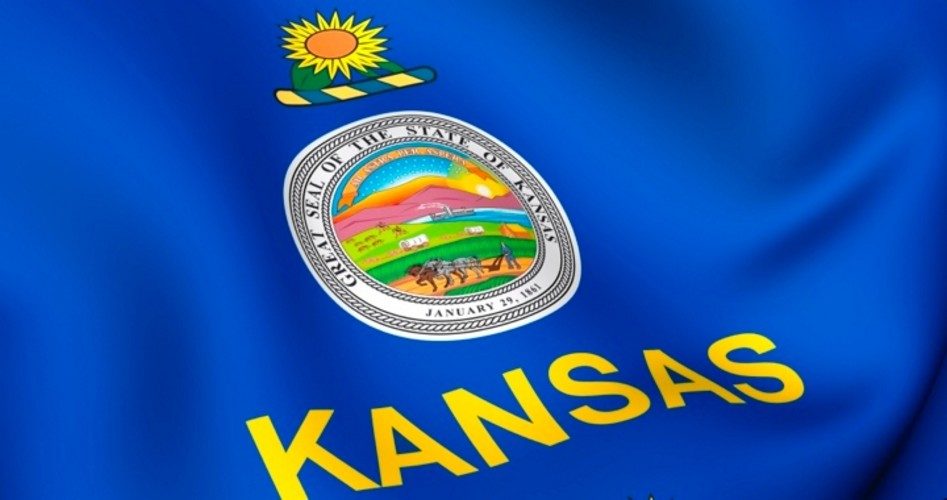
Kansas House members debated until midnight Thursday whether to raise sales and cigarette taxes in order to close the state’s budget deficit. The House had just resoundingly defeated a previous measure that would have raised those taxes even more, but the state is facing a deadline to balance its budget, required under its constitution.
There’s a roughly $400-million shortfall this year, which is estimated to increase for the next several years.
Left-wing pundits have had a field day taking Governor Sam Brownback to task for calling his massive tax cuts enacted in 2012 an “experiment,” a “shot of adrenalin,” and similar to Ronald Reagan’s experiment based on the Laffer Curve: Reducing tax rates will increase tax revenues as the economy grows.
Paul Rosenberg, senior editor of Random Lengths News, a tiny weekly newspaper operating out of Long Beach, California, is a good example. His paper describes itself as an “independent progressive newspaper” with a readership of 63,000 that “is proud of the support from the Harbor Area labor unions, who allow us exclusive distribution inside most of their union halls.”
Rosenberg managed to get a screed attacking Brownback published in the hard-left Salon magazine in which he describes the Kansas governor as one of those “noxious soundbyte conservatives” who are guilty of “extremism” when it comes to running a state’s finances. He decried the tax cuts that eliminated taxes on 281,000 small business owners and 53,000 farmers and shifted the burden, he says, onto children through cuts in education spending. He claimed that Brownback’s “experiment” has “utterly failed to materialize” any tax revenues and that the resultant budget shortfalls were “inescapable.”
It is true that both Moody’s and Standard & Poor’s credit rating agencies have downgraded Kansas bond ratings in light of shortfalls in the state’s projected tax revenues. It is also true that the state’s bond ratings are still considered investment grade, with S&P dropping its rating from AA+ to AA — from the second tier from the top to the third tier from the top.
It’s also true that there is substantial evidence that Brownback’s so-called experiment is working.
Andrew Wilson, writing in the Wall Street Journal in May, reviewed the latest numbers from the Sunflower State:
In March 2013, unemployment in Kansas stood at 5.5%. It has since dropped to 4.2%, tied for 14th lowest in the country.
From 1998-2012, Kansas ranked 38th in private sector growth … in 2013 — the first year after the tax reform — the state climbed to 27th place, and in 2014 it moved to 21st…
In the second half of 2014, hourly wages in Kansas grew 3.5% … far faster than the national average of 1.9%.
Perhaps the best laboratory test case — that of Kansas City — reveals how well Brownback’s reform is working. Wilson called it a “living experiment” because half the city is in Kansas and the other half is in Missouri. In Kansas the top personal income tax rate is 4.9 percent beginning at $15,000 for a single filer, while in Missouri the top rate is six percent which starts at $9,000.
Over the last two years, private-sector jobs have increased by 5.6 percent on the Kansas side, while job growth on the Missouri side was just 2.2 percent. Over the same period hourly wages grew by $1.22 in the Kansas half of the city compared to just $0.61 in the Missouri half.
Patti Bossert owns two employment agencies in Topeka, where business is booming. Thanks to Brownback’s tax cuts she saved $40,000 in taxes last year. And what is she doing with those savings? Hoarding them? Hiding them offshore? Buying government bonds? Stashing them under her mattress? No. She purchased and renovated an old building for $375,000 to serve as her company’s new headquarters. She told Wilson:
Our business has been phenomenal. Wages are going up, and the big problem now is that there are many more available job openings than there are qualified people to fill them.
She worries that Kansas legislators will quash the economic revival just as it’s gaining momentum. Cutting taxes in 2012 didn’t impact taxpayers until a year later. Entrepreneurs, skeptical of government policies in general, usually wait to see if the reforms are permanent before making long-term commitments. It just takes time, said Bossert: “We have to stay the course to reap the real long-term benefits of this reform.”
Governor Brownback is staying the course, and enjoying the ride: “I love the debate on wage growth because the left wants to push mandatory minimum-wage growth. They want to do it by statute, and we will do it by growth.”
A graduate of an Ivy League school and a former investment advisor, Bob is a regular contributor to The New American magazine and blogs frequently at www.LightFromTheRight.com, primarily on economics and politics. He can be reached at [email protected].



